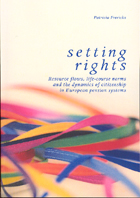
Setting rights: Resource flows, life-course norms and the dynamics of citizenship in European pension systems / Patricia Roxane Helena Frericks - [S.l.] : [s.n.], 2007 - Doctoral thesis Utrecht University

 |
Setting rights: Resource flows, life-course norms and the dynamics of citizenship in European pension systems Setting rights: Resource flows, life-course norms and the dynamics of citizenship in European pension systems / Patricia Roxane Helena Frericks - [S.l.] : [s.n.], 2007 - Doctoral thesis Utrecht University |
The title of my thesis already indicates that I did my research on what is called a hot topic: pensions in Europe. In all countries, pensions are built up through the labour market. This is true in two perspectives: firstly, for the individual entitlements and, secondly, for the financial means. With other words, the legitimation and the source of pensions are channelled through the wage. This logic is obsolete in present-day economies since the units of social rights changed as well as the economic and demographic situation. One should not forget that it is several decades ago that the different pension systems were introduced. Since then, the dynamics of capitalist economies changed the variables of the system and their interrelatedness. Consequently, reform policies need to be accompanied by updating the assumptions of the original systems. I approached the problematic institutionalization of the life-course and of resource flows through two concepts, that of the life course, put forward by Martin Kohli, and that of instituted economic processes, put forward by Karl Polanyi. Based on this comprehensive and anthropological approach the result of my research is that different countries' pension logics need to be combined and redefined. Let me concentrate on the individual entitlements first. Recent pension reforms tie pension rights to an ideal work biographies. In addition, they transform pensions to individual entitlements by abolishing derived rights such as widows pensions. This pension logic, one might say, assumes an adult worker model, as Jane Lewis called it. This adult worker model, however, is not to be found in any European country. In addition, the calculation norms of pensions even widen the well-known gender wage gap. Therefore, I analysed welfare systems in more detail and also other but labour market entitlements. These are on the one hand, countries that value learning periods and caring responsibilities, such as France, Austria, and Germany, and, on the other hand, countries whose pension systems entail residency based pensions, such as Denmark or the Netherlands. And although these systems are better from a practical as well as normative point of view, full pensions are, also in these systems, linked to an individual work biography in an ideal and therefore non-adequate way. My research also showed that recent reforms do not improve individual pension rights. Nonetheless, individual entitlements, and those of women in particular, are increasingly important since pension systems develop from a social insurance to a kind of individual account and investment system. This is even more the case since retrenchments of public pensions ask for building up pensions in several schemes which generally calculate entitlements on a more direct link to paid contributions. Let me now come to the second side of the pension coin which is that of resources. Welfare arrangements are still financed through the wage, either through contributions or through taxation. However, the wage-relatedness of resource flows is problematic since life courses change so that relatively shorter periods of time are spent in paid employment and relatively more periods of time are spent on education and retirement. Changing policies to stimulate longer working biographies are first efforts to ease this misbalance of 'producing' resources and benefiting from them. However, since education and care is increasingly part of the agenda as necessary means to sustain capitalist economies, it seems necessary to include other but financial resources. In concrete, there are academic demands to include 'solidaric elements' (a term put forward by John Myles), which is care in particular, in the calculation of the GNP. In short, the different economic modes of market exchange, welfare economies, household economies and voluntary activities need to be taken into consideration. As a consequence, sustainable welfare systems need to include more than labour market related entitlements into their pension norms. Pensions then would be composed of a variety of pension entitlements linked to contributions that go beyond the labour market. keywords: life-course, social policy, pension norms, pension reforms, Europe, pension credits, residency based pensions, resource flows |